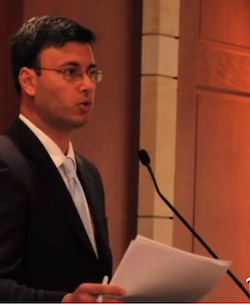US healthcare system
See the following -
Is the US Healthcare System Suffering from the Dunning-Kruger Effect?
 Psychologist David Dunning, originator of the eponymous Dunning-Kruger effect, recently gave an interview to Vox's Brian Resnick. For those of you not familiar with the Dunning-Kruger effect, it refers to the cognitive bias that leads people to overestimate their knowledge or expertise. More importantly, those with low knowledge/ability are most likely to overestimate it. Does this make anyone else think of the U.S. healthcare system? Professor Dunning proposed the effect in 1999, in a paper in Journal of Personality and Social Psychology, along with then-graduate student Justin Kruger. Since then, it has become widely known and broadly applied (not always accurately, as Dr. Dunning explains in the interview).
Psychologist David Dunning, originator of the eponymous Dunning-Kruger effect, recently gave an interview to Vox's Brian Resnick. For those of you not familiar with the Dunning-Kruger effect, it refers to the cognitive bias that leads people to overestimate their knowledge or expertise. More importantly, those with low knowledge/ability are most likely to overestimate it. Does this make anyone else think of the U.S. healthcare system? Professor Dunning proposed the effect in 1999, in a paper in Journal of Personality and Social Psychology, along with then-graduate student Justin Kruger. Since then, it has become widely known and broadly applied (not always accurately, as Dr. Dunning explains in the interview).
- Login to post comments
U.S. Healthcare Is a Cadillac...Unfortunately
 The good news: the U.S. healthcare is a Cadillac. The bad news: it's not an Escalade or even an XTS, it's a Cimarron, which is on most experts' list not only of the worst Cadillacs ever but also the worst cars ever -- expensive and poor quality. It was literally a Chevy Cavalier dressed up and trying to pretend to be a luxury car. You probably get the metaphor. There was a time when "Cadillac" was essentially a synonym for quality. Products aspired to be "the Cadillac of ____." It was a compliment of the highest order, understood worldwide. Foreign auto manufacturers tried to match its quality and make a dent into its market share. There was a time with U.S. healthcare had that kind of status too.
The good news: the U.S. healthcare is a Cadillac. The bad news: it's not an Escalade or even an XTS, it's a Cimarron, which is on most experts' list not only of the worst Cadillacs ever but also the worst cars ever -- expensive and poor quality. It was literally a Chevy Cavalier dressed up and trying to pretend to be a luxury car. You probably get the metaphor. There was a time when "Cadillac" was essentially a synonym for quality. Products aspired to be "the Cadillac of ____." It was a compliment of the highest order, understood worldwide. Foreign auto manufacturers tried to match its quality and make a dent into its market share. There was a time with U.S. healthcare had that kind of status too.
- Login to post comments
Using Open Technology To Build a Biodefense Against the Coronavirus
 As the number of US cases of the coronavirus rises, how will healthcare professionals be able to tell the difference between which panicked patients with similar symptoms has what? Even if the patient hasn't traveled to Wuhan or China recently, what if they sat at a Starbucks with someone who did? With the incubation time-lag before symptoms appear, who would even know? The challenge of monitoring 330 million people for infectious disease outbreaks is daunting. Take the flu as an example. During the last flu season which, as already discussed, was not as complex as this year's season, approximately 35.5 million Americans had flu symptoms, 16.5 million received medical care, 490,600 were hospitalized and 34,200 died.
As the number of US cases of the coronavirus rises, how will healthcare professionals be able to tell the difference between which panicked patients with similar symptoms has what? Even if the patient hasn't traveled to Wuhan or China recently, what if they sat at a Starbucks with someone who did? With the incubation time-lag before symptoms appear, who would even know? The challenge of monitoring 330 million people for infectious disease outbreaks is daunting. Take the flu as an example. During the last flu season which, as already discussed, was not as complex as this year's season, approximately 35.5 million Americans had flu symptoms, 16.5 million received medical care, 490,600 were hospitalized and 34,200 died.
- Login to post comments